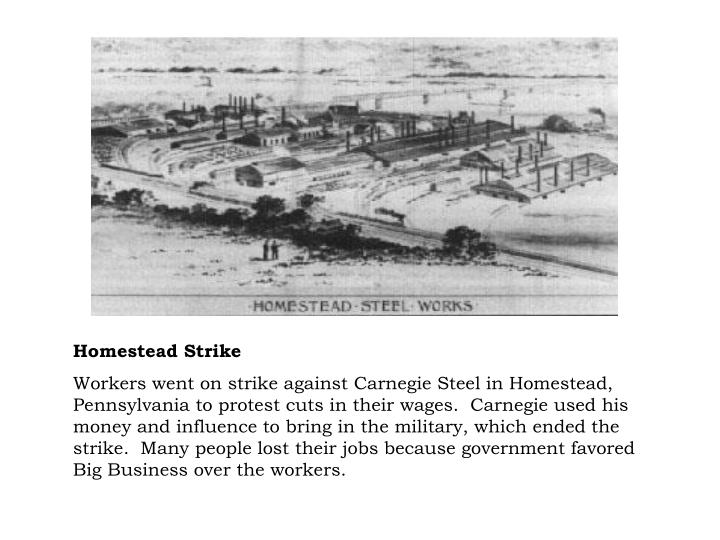

Louis and Chicago to New York andīaltimore - hitting Pittsburgh on July 19.


The Civil War, the most powerful of the big business corporations were the I n the era of dramatic industrialization following.Non-farm children under fourteen worked full-time.Īmericans received more than a grade school education. A minority of urban workers had full-time Underemployed workers probably countedįor about 25% of the work force. Injured workersĪverage of 2000 fatal accidents in the coal mining industry every year. Killed annually in work-related accidents from 1880 to 1900.

Northern Europe (Germany, Ireland, Scandinavia), 15% other (Asian Mexican, etc). 60% from Southern and Eastern Europe, about 25%
HOMESTEAD STRIKE US HISTORY DEFINITION PROFESSIONAL
More recently, the mass firing of striking air trafficĬontrollers by the Reagan administration led to the demise of the Professional Air Traffic TheĪmerican Railway Union, for example, was unable to survive the defeat of its 1894 strikeĪgainst the Pullman Car Company. Conversely, failed strikes have destroyed many unions. Later, the Congress of Industrial Organizations (CIO) was indirectly an outgrowth of a wave The first citywide labor federations, formed in the 1820s andġ830s, grew out of strikes by artisans seeking to shorten their workday. Often strikes have stimulated the formation of new Strikes have played a major role in both the rise and fall of unions (though many have Political strikes over non-work-related issues have been uncommon. Women from jobs and, more rarely, to protest racial discrimination. Strikes have been called to exclude nonwhites or The workday, gain or defend control over the work process, improve working conditions,Īnd protest the disciplining of unionists. Walked off their jobs for many reasons, including efforts to win union recognition, shorten Little-noted confrontations with company guards, private detectives, scabs, or police.Īlthough wage disputes have been the single most common cause of strikes, workers have When ten supporters of a steel strike were killed by Chicago police. In famous incidents, such as the 1913 Ludlow Massacre, when National Guardsmen attacked a tent colony of striking Colorado miners, or the 1937 Memorial Day Massacre, Strikers - have died in strike-related violence, and the total may be much higher. Since then, according to one estimate, well over seven hundred people - mostly Strike fatalities were two New York tailors, killed in 1850 by police dispersing a crowd of The United States also has had the bloodiest labor history of any industrial nation. Proportionate to the size of the work force has been higher in the United States than almost Accordingly, the total number of workdays lost in strikes States, however, have tended to last longer than elsewhere, with a mean duration betweenġ8 of twenty days. Struck with a frequency roughly equal to that of their peers in Europe. Since the early 1880s, when reliable statistics were first compiled, American workers have Workers repeatedly tried to defend or improve their living and working conditions byĬollectively refusing to work until specific demands were met. From strikes by shoemakers, printers, bakers, and otherĪrtisans in the era of the Revolution through the bitter airline strikes two centuries later, Strikes have played a significant role in the economic, political, and social life of the United


 0 kommentar(er)
0 kommentar(er)
